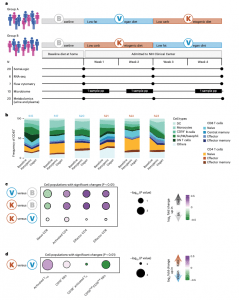Scientists are still grappling with understanding how different diets impact the balance between immunity and our gut bacteria (microbiome). Therapeutic nutritional interventions – essentially using food as medicine – haven’t been thoroughly explored, and comparing multiple diets head-to-head is even rarer. A recent study has compared the impacts of two diets: the plant-based vegan and the high-fat, low-carb keto diets on our immune system (Figure 1).

Figure 1: NK and T cells are significantly affected by change in diet. a, Schematic of experimental setup. Twenty participants were split into two groups (first group: 4 females (pink), 6 males (blue); second group: 5 females, 5 males), with one group starting on vegan diet for 2 weeks and then immediately changing to ketogenic diet (Group A), whereas the other group started with ketogenic diet and changed to vegan diet (Group B). Data (indicated on the bottom) were collected directly before first diet as baseline, and at the end of the first and second diets. For microbiome samples, data were collected on different days (refer to Extended Data Fig. 1k for more details). b, Frequency of main cell types (as frequency of all CD45+ live cells) measured by flow cytometry for baseline, ketogenic and vegan diets shown for each participant. For the gating strategy for flow cytometry, see Extended Data Table 1 and Extended Data Fig. 2. Order of diet listed in this panel is the same for all participants independent of their first diet. Color of individual on top of the plot denotes starting diet (orange, ketogenic diet; blue, vegan diet). c, Fold changes of cell populations whose frequency significantly changed between ketogenic/vegan diet and baseline diet (P value < 0.01) (purple, upregulated in vegan/ketogenic diet; green, upregulated in baseline diet). Dots are scaled by −log10(P value). Significance was calculated by two-sided paired t-test. d, Fold change of cell populations whose frequency significantly changed between ketogenic and vegan diets (P value < 0.01) (purple, upregulated in ketogenic diet; green, upregulated in vegan diet). Dots are scaled by −log10(P value). Significance was calculated by two-sided paired t-test. For gating strategy refer to Extended Data Fig. 2 and ref. 37. Regulatory T (Treg) cells, CD127lowCD25highCCR4+HLA-DR+; CD16+ NK cells, CD3−CD19−CD14−HLA-DR−CD123−CD56+CD16+; activated T helper (TH) cells, CD3+CD19−CD4+CD8−HLA-DR+CD38+; activated NK cells, CD3−CD19−CD14−HLA-DR−CD123−CD56+CD16lowCD57high. BA, baseline; DC, dendritic cells; DN, double negative; Gr, granulocytes; pp, per person; S, sample.
Researchers recruited a small group, each participant spent two weeks on both the vegan and keto diets, in random order, while scientists meticulously monitored their immune responses like attentive spectators in a coliseum.
A vegan diet was associated with strengthening the innate immune system, our body’s first line of defence. Additionally, it boosted pathways related to red blood cell production and influenced the composition of gut bacteria.
The keto-diet, while lacking the broad defensive boost of the vegan diet, keto focused on honing adaptive immunity, which targets specific invaders. It impacted a wider range of immune proteins and even reached beyond the immune system, affecting proteins in tissues like the brain and bone marrow.
Both diets triggered changes in how the body processes energy (metabolism) and the composition of gut bacteria. However, the study only observed these changes, not their long-term impact. Are these shifts beneficial or detrimental? Could they hold the key to using diet to combat diseases like cancer or inflammation? More research is needed to unlock these mysteries.
Journal article: Verena M. Link, V.M., et al., 2024. Differential peripheral immune signatures elicited by vegan versus ketogenic diets in humans. Nature Medicine.
Summary by Stefan Botha










